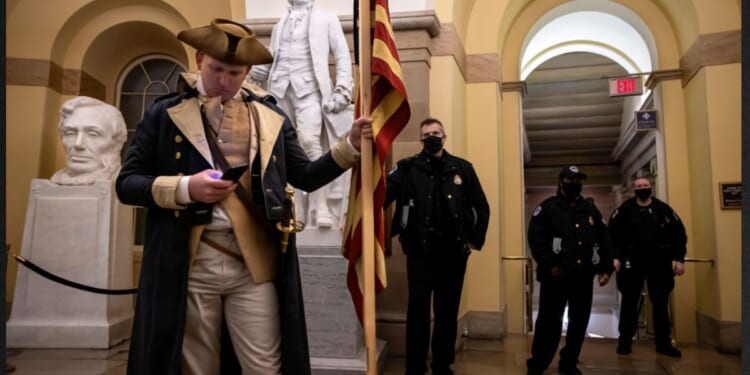We’ve learned some new terms in recent years.
“Insurrection” is one of them. And “lawfare.”
“Insurrection” is a favorite word thrown around by Democrats, journalists, squishy Republicans and legacy media consumers when discussing the events of Jan. 6, 2021.
“We saw it all,” they will tell you — an insurrection, with MAGA rioters carrying Trump, American and Gadsden flags climbing the walls of the Capitol, pushing aside police, threatening Congress, committing unspeakable terror on the scale of the World Trade Center and Pentagon attacks of Sept. 11, 2001, or even the Japanese attack on Pearl Harbor in 1941.
Or as Time Magazine this week said: “… a pro-Trump mob attacked the center of American democracy in an effort to subvert the peaceful transfer of power …”
But unlike 9/11 and Pearl Harbor, where some 3,000 died in each incident, only one person was killed on Jan. 6 — unarmed Air Force veteran Ashli Babbitt, shot by a Capitol Police officer.
After the event, some were arrested and imprisoned without trial in a dank Washington prison.
Some 800 people were convicted or entered guilty pleas, some just for coming into the Capitol at the invitation of the Capitol Police, some just casually wandering into the People’s House.
As footage of the events of Jan. 6 continues to be reviewed, it’s obvious that what happened diverges from what legacy media described or cherry-picked in showing in their claim of insurrection.
If elected, do you think Trump should pardon the Jan 6 prisoners?
Some skeptics believe the entire event was orchestrated, to the point there was a discarding of a call by then-President Donald Trump for National Guard troops at the Capitol.
And there are questions about involvement by the FBI — or at least its informants — prompting some critics to use another new term — “fedsurrection.”
Setting aside any deliberate federal instigation, it’s generally acknowledged that there were some Trump supporters who got out of hand that day.
But even that prompts a contrast.
The events of Jan. 6 — in light of official indifference to things like the evident corruption of the Joe Biden family, ongoing criminal activity in blue-state urban areas, and the tolerance of months of violent Black Lives Matter riots throughout 2020 — display evidence of a “justice” system that favors some and persecutes others.
I’m not the only one who says that. Donald Trump does, too.
“It’s two-tier system,” Trump told Time Magazine in an interview published Tuesday.
“Because when I look at Portland, when I look at Minneapolis, where they took over police precincts and everything else, and went after federal buildings, when I look at other situations that were violent, and where people were killled, nothing happened to them,” Trump said.
“Nothing happened to them,” he repeated. “I think it’s a two-tier system of justice. I think it’s a very, very sad thing. And whether you like it or not, nobody died, other than Ashli.”
If re-elected president, Trump told Time he intends to pardon the Jan. 6 participants.
TIME: “Will you consider pardoning every one of them?”
TRUMP: “I would consider that, yes.”
TIME: “You would? “
TRUMP: “Yes, absolutely … If somebody was evil and bad, I would look at that differently.
“But many of those people went in, many of those people were ushered in. You see it on tape, the police are ushering them in. They’re walking with the police,“ Trump said.
Which brings us to that other new term, “lawfare.”
Trump faces that now, as prosecutors and even judges wage legal war on the former president, tying him up in court, meaning he can’t campaign, unaware that, like his famous mug shot now on T-shirts, their court actions seem to be bringing him support.
It doesn’t stop there — legal moves have been taken against his lawyers, and even against officials questioning the validity of the 2020 election.
On it goes, day by day, new twists and turns undermining the Republic.
Here’s hoping that we will be able to return to a U.S. standard where we no longer have to put the word “justice” in quotation marks.













